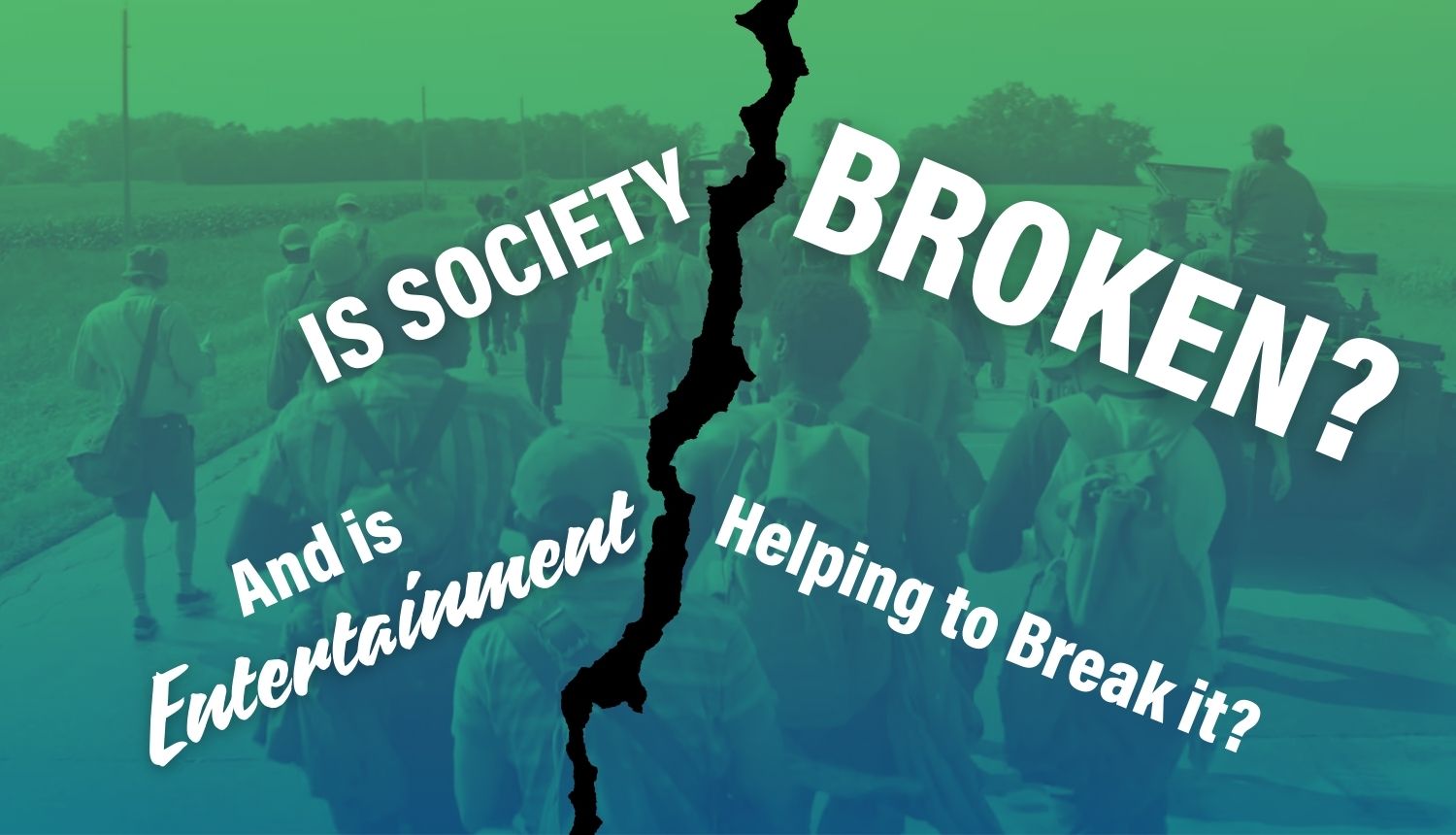Sitting through 5 and a half hours of performance might seem like an exercise of will and determination, rather than an enjoyable experience. All that can go wrong actually might, and getting oneself to bother one’s fellow row-peers on the way out might prove itself to be impossible. Stuck – for almost six hours (or at least 3, until the interval). Caged, even? And how about the already infamous low attention span caused by increasing screen time? All these in a foreign language?!
But how about you just sit back and enjoy, Teodora?!
Since when did a performance become too long days before you actually got the ticket?! Since when did you forget that the duration is part of the performative experience, that the separation in acts, and the internal division into scenes and even “subchapters” amasses as much performative value as the acting and the directorial choices themselves? Since when did you forget to trust the process?
As this is exactly what happens – Krzysztof Warlikowski, willingly or not, prepares the audience for his Nowy Teatr Anioły w Ameryce [EN: Angels in America] by building up an anxiety-like fear of the unknown, mirroring the generalized feeling of incapacity to fight against disease, death and, to an extent, destiny that define the entire play and performance.
Following three major parallel stories, Angels in America exhibits the characters in a diorama of the ‘80s upper-class New York City, a microcosm that gets increasingly smaller as the story progresses, and where contagion seems unavoidable. Intertwined, these narrative threads touch upon more than AIDS-related complications of daily lives, branching out into the characters’ psychologies and, in the case of Roy Cohn (Andrzej Chyra), a death- and guilt-ridden delusion.

Angels in America, by Tony Kushner, translated by Jacek Poniedziałek, directed by Krzysztof Warlikowski. Nowy Teatr Warsaw Credits: Stefan Okołowicz
In spite of this upper-class setting, in the offices and homes of NYC lawyers, there is a sense of marginality lingering – Prior (Tomasz Tyndyk) is a (now) failed actor, about whose past successes very little is known, him and Louis (Jacek Poniedziałek), his partner, have a failing relationship, degrading as a result of Louis’ incapacity of dealing with and, eventually, accepting the inevitability of his lover’s death. Harper (Maja Ostaszewska), Valium addicted, is stuck inside the “walls” of her lavender marriage; Joe (Maciej Stuhr), a married Mormon, is struggling to come to terms with his sexuality, and Roy has to face not only his crippling battle with AIDS, but also his crippling racism, homophobia, sexism, and… professional corruption. No one is anywhere remotely close to the bearable middle of the “complete failure – utterly successful” axis. Not even the angels.
In Warlikowski’s production, the divine in Prior’s vision (Magdalena Cielecka) exhibits levels of vulgarity that could hardly be associated with the clerical side of life, rather presenting themselves (they specify that they are above the concepts of gender or sex) as the “living” image of the stereotypes faced by the LGBT+ community under Reagan’s policies. But not everyone sees this Angel and, still, they are faced with the realization that each of them is under some sort of divine surveillance – Harper is guided and protected, implicitly observed, by her imaginary travel companion (eventually taking shape as Prior), Roy is paired with Ethel Rosenberg, this angel of death that seems to have come for her own benefit, avenging her verdict, rather than with a divine purpose, and all the patients are under the protective wing of Belize (Rafał Maćkowiak), a strange character with a questionable morality, stealing vital medicine from the rich and giving it to the one who could not afford it, in spite of the treatment being still in the testing phase…


Angels in America, by Tony Kushner, translated by Jacek Poniedziałek, directed by Krzysztof Warlikowski. Nowy Teatr Warsaw Credits: Stefan Okołowicz
These omnipresent references to the 80s’ society’s periphery do not, however, weigh down on the story, but rather humanize the social elites whose lives are put on display for the audiences to watch and see, homogenizing the group of characters as victims of the unforgiving AIDS. This becomes a reminder of the more recent pandemic, omnipresent and indiscernibly contagious.
Contrary to initial expectations and to the way in which the story unfolds, the five-and-a-half hours do not pass monotonously, with Harper’s comments and stories constantly bringing a touch of humor to the otherwise grim sequence of events. It is also thanks to her and Ruth’s characters that the three main storylines do not feel as interconnected as they actually are – with Belize’s presence also passing by as a coincidence in the hospital’s environment, rather than another token of narrative entanglement.
In both Tony Kushner’s original play and Warlikowski’s Nowy Teatr production, no character (not even the imaginary ones, the Angels/”angels”) is inherently good or bad – the spectators are only showed excerpts of their lives in a disease-controlled and disease-ridden setting, which leads to the necessity of believing them when they reference their before-life. The same way, no character is inherently not-judgeable – victim or not (i.e. infected or not), they all exhibit at least one moral issue, most frequently cowardness and the incapacity to address their status quo and face the consequences – Louis does not take accountability for his side of the relationship he has with Prior, nor does he fully admit, until very late in the story, that he is lacking the courage to face his partner’s physical degradation and untimely death, Roy refuses, for the longest time, to accept the fact that he does, in fact, like having intercourse with men for pleasure, rather than for asserting authority, as he initially claims, while Harper, although her case is different than the former, given her Valium issue, refuses to accept that “love is not enough” and prefers to keep herself in a marriage that is, beyond unfaithful, detrimental to her mental health (and physical health, given the sanitary crises portrayed in the play). All these raise the question of how believable Warlikowski’s version truly is and how much is part of the theatrical contract the public “signed” for almost six hours.


Angels in America, by Tony Kushner, translated by Jacek Poniedziałek, directed by Krzysztof Warlikowski. Nowy Teatr Warsaw Credits: Stefan Okołowicz
On this “quest for believability”, there is a series of elements that aid with the relatability of the story – the first level towards something becoming credible. Staged in Central-Eastern Europe in 2007, Angels in America had to rely only on bits of imagery in order to build a set design that did not seem presentational and performative in the sense of it being curated specially to support the temporality of the production. The line of mismatched chairs, the couch, the hospital bed, and even the coffin in the opening scene hint to the 60s’ rather than the AIDS crisis’ decade, but nothing is misplaced or bothers the viewer, not even the (now conventionally kitsch) reflective wall, remnant from the world of space-travel aesthetic. The veridicity of the entire plotline is also heavily supported by the diversity of religions and, to an extent, professions and social backgrounds, which, in turn, reflect the social “skyline” of New York City, possibly standing as a basis for easily accepting the fact that, in spite of not being fully true to Kushner’s text (Belize is, in the original play, as well as in some lines of Warlikowski’s production, a woman of colour), the story is depicting Reality.
The initial fear of being caged in the theatre, with no common-sense-based escape, for almost six hours transformed us, the spectators, into participants, just as unable to escape their situation as the characters, as deprived of the capacity to choose as the “angels” who lost their wings while battling the cruel disease. The mirror-wall was reflecting not only the actors on the stage, but also the “actors” in the auditorium, all of us mere pawns in the grand scheme of life’s fragility, a little too late to do anything but witness the story unfoldin
This post was written by the author in their personal capacity.The opinions expressed in this article are the author’s own and do not reflect the view of The Theatre Times, their staff or collaborators.
This post was written by Teodora Medeleanu.
The views expressed here belong to the author and do not necessarily reflect our views and opinions.

















